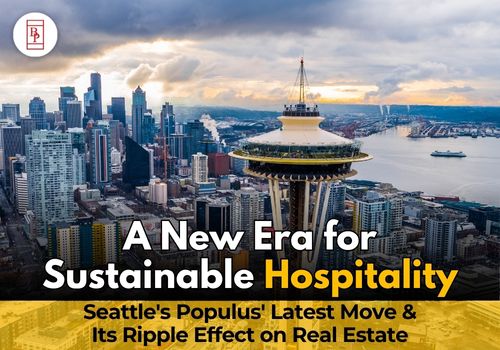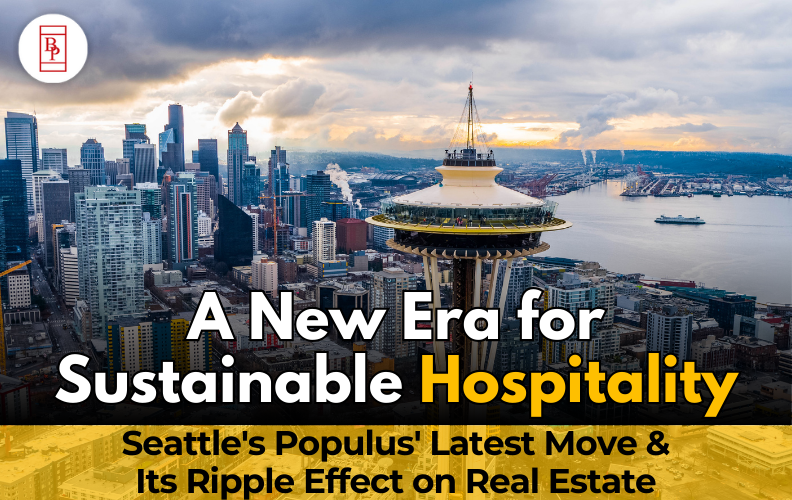A New Era for Sustainable Hospitality: Seattle's Populus' Latest Move and Its Ripple Effect on Real Estate

 As the global hospitality industry shifts toward sustainability, few names have generated as much buzz as Populus. Known for launching the world's first carbon-positive hotel in Denver, Populus has now announced the opening of its second carbon-positive hotel this time in our own backyard - Seattle. The new development has stirred excitement among environmental advocates, local businesses, and, notably, real estate professionals, including the many
As the global hospitality industry shifts toward sustainability, few names have generated as much buzz as Populus. Known for launching the world's first carbon-positive hotel in Denver, Populus has now announced the opening of its second carbon-positive hotel this time in our own backyard - Seattle. The new development has stirred excitement among environmental advocates, local businesses, and, notably, real estate professionals, including the many
Seattle real east agent closely watching its impact. But what does this mean for the local residential market?
In this post, we'll explore the environmental, economic, and social impacts of the new Populus hotel—and how its presence may reshape the residential real estate landscape in the area.
What Is a Carbon-Positive Hotel?
Before diving into the implications, it’s important to understand what makes a hotel “carbon positive.”
While most green buildings aim for “carbon neutral” status (offsetting their emissions through green energy, carbon credits, or other sustainability efforts), a carbon-positive building goes a step further. It absorbs more carbon dioxide from the air than it releases. Populus achieves this through a combination of sustainable building materials, passive energy design, smart technology, and large-scale forestation partnerships. For every night stayed, a portion of the hotel's earnings funds verified forest restoration projects, ensuring that the property creates a net-positive environmental footprint.
This isn't just a marketing gimmick—it's a pioneering model of how hospitality and sustainability can work hand in hand.
Why the Second Populus Hotel Matters
The opening of the second Populus hotel is a signal that carbon-positive development isn't just a trend—it's a growing movement. The decision to build the second hotel here sends a message: our area is ripe for innovation, and it’s attracting forward-thinking investors who care about the long-term health of both people and the planet.
For the local community, this development brings:
-
Increased tourism and foot traffic, which benefits small businesses.
-
Job creation, particularly in green construction, hospitality, and environmental science.
-
Higher property values, as sustainable and high-quality amenities, enhance the area's reputation.
-
Environmental leadership, positioning the region as a model for sustainable urban planning.
Economic Ripple Effects on the Community
A project of this magnitude creates a domino effect on the local economy. When high-profile hotels move into a region—especially those that carry strong values like sustainability—it tends to boost confidence in the local market.
Job Creation
Populus' hotel is more than just a structure—it’s a catalyst for job creation. From architects and contractors during construction to hotel staff and maintenance crews post-opening, the hotel creates hundreds of employment opportunities. But even more importantly, it promotes a new class of “green jobs.” These include roles in renewable energy management, carbon auditing, environmental design, and sustainability consulting.
Business Growth
Restaurants, cafes, boutiques, and entertainment venues all benefit from increased visitor traffic. The kind of tourist attracted to a carbon-positive hotel is often eco-conscious, affluent, and looking for experiences that reflect their values, creating demand for premium, local, and sustainable goods and services.
Shifts in Local Infrastructure
To support a hotel of this caliber, municipalities often prioritize infrastructure upgrades—think improved roadways, public transit, walkability improvements, and even bike-share programs. These improvements benefit both tourists and greatly enhance everyday life for locals.
Neighborhoods near the hotel will likely see:
-
Better street lighting and safety features
-
Public art installations and green spaces
-
New zoning for mixed-use developments
-
Enhanced public transportation access
These upgrades typically have a positive correlation with rising home values.
The Real Estate Connection: How Residential Markets Benefit
Now let’s turn to the heart of the matter: how will the second Populus hotel impact residential real estate in the area?
1. Rising Property Values
Eco-conscious luxury developments like Populus create a “halo effect” that boosts nearby property values. Buyers want to live near progressive, sustainable landmarks that reflect a modern lifestyle. The appeal of walkability to a state-of-the-art, carbon-positive hotel will not go unnoticed—especially for those who value low-emission living and community-oriented design.
Historical data shows that neighborhoods surrounding iconic hotels often experience an uptick in property prices within 12–24 months after opening. This is even more pronounced when the hotel is aligned with emerging lifestyle trends such as sustainability.
2. Increased Demand for Green Homes
As Populus raises awareness about carbon-positive living, prospective homeowners may start demanding more energy-efficient and eco-friendly homes. Builders and developers will likely pivot toward LEED-certified, net-zero, or carbon-neutral homes to meet this growing demand.
This evolution will spark a wave of green residential developments featuring:
-
Solar panels and battery storage systems
-
Rainwater harvesting systems
-
Smart thermostats and home automation
-
Non-toxic, sustainable building materials
Expect the term “eco-conscious neighborhood” to become a major selling point.
3. Attraction of Tech and Sustainability Professionals
Sustainable projects tend to attract professionals in tech, science, and clean energy—people who are highly mobile, well-compensated, and often in search of vibrant, walkable neighborhoods. These individuals are typically drawn to areas that reflect their values, including environmental stewardship, innovation, and urban convenience.
Their presence stimulates demand for modern, high-end housing, often within walking distance of central hubs like the Populus hotel. This could lead to an influx of new buyers, putting upward pressure on home prices and decreasing vacancy rates.
4. Investment and Rental Opportunities
Real estate investors will see the area as a prime location for short-term and long-term rentals. The hotel will bring a steady stream of tourists, business travelers, and conference attendees, many of whom may seek alternative accommodations. This can lead to:
-
A surge in short-term rental listings (e.g., Airbnb, VRBO)
-
Higher occupancy rates for existing rental units
-
Opportunities to furnish and market homes as eco-stays
If local zoning laws permit, this could turn into a lucrative niche for real estate investors focused on sustainable tourism.
Long-Term Impact on Urban Planning and Development
Populus is not just building a hotel—it’s helping set the tone for how cities will develop in the future. Local policymakers, urban planners, and developers are taking notes. The hotel’s success could inspire more climate-forward infrastructure, including:
-
Climate-resilient housing communities
-
Zero-emission transportation corridors
-
Urban forests and biodiversity zones
-
Mixed-use spaces that merge living, working, and recreation
Communities that embrace these changes early will likely see sustained appreciation in real estate values and increased quality of life for residents.
Sustainability as a Core Value in Real Estate
Just a few years ago, “sustainability” in real estate was viewed as a niche preference. Today, it’s a major priority—and Populus is accelerating that transition. Homebuyers are no longer just looking at granite countertops and school districts. They're asking about energy ratings, proximity to green spaces, and carbon footprints.
As these priorities evolve, agents and brokers must adapt. This includes becoming fluent in:
-
Green certifications (LEED, ENERGY STAR, Passive House)
-
Utility cost projections
-
State and federal rebates for eco-upgrades
-
Sustainable materials and appliances
Agents who can connect clients to eco-conscious opportunities will be more valuable than ever.
Community Identity and Pride
Perhaps one of the most profound (and less tangible) benefits is a renewed sense of community pride. A city that hosts a carbon-positive hotel signals to the world that it’s forward-thinking, values sustainability, and is willing to innovate. This boosts civic pride, encourages local activism, and fosters a culture of improvement.
That kind of intangible momentum affects everything—from how homeowners invest in their properties to how children are educated about sustainability in schools. It creates a feedback loop where everyone, including the environment, benefits.
Potential Challenges and Considerations
While the impact of Populus’ second carbon-positive hotel is largely positive, there are also a few considerations to keep in mind.
Gentrification Risk
With rising property values comes the risk of pricing out long-time residents. Cities must work to balance eco-luxury development with affordable housing initiatives to ensure equitable growth.
Regulatory Pressure
The introduction of more green standards may also lead to stricter building codes, potentially increasing construction costs. This could create a barrier for smaller developers or individuals building on a budget.
Market Volatility
While green investments are growing, the market must be prepared for fluctuations in demand and regulatory shifts. Developers and homeowners alike need to diversify and stay informed.
Final Thoughts
Populus’ decision to open its second carbon-positive hotel here marks a pivotal moment in our area’s growth. More than just a hotel, it’s a symbol of what’s possible when luxury, sustainability, and community come together. For residential real estate, it means increased property values, heightened demand for green homes, and a surge in both interest and innovation.
Whether you’re a homeowner, buyer, investor, or simply someone who cares about the future of your city, this development should be on your radar. It’s more than an exciting project—it’s a glimpse into the future of how we live, travel, and build together.
If you're considering buying or selling a home in this evolving market—or if you're simply curious about how these changes may affect your neighborhood—reach out today. Let's talk about how you can position yourself to thrive in this exciting new chapter.